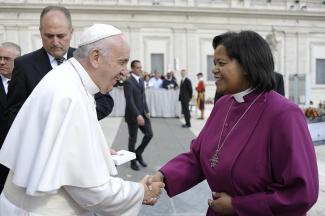Ten of the Episcopal Church’s 12 active bishops suffragan—including Bishop Gayle E. Harris of the Diocese of Massachusetts—gathered in Rome last month, where they had the chance to join the weekly papal audience on Oct. 7 in St. Peter’s Square.
“We were surprised to be given places of honor and to have the pope come down and greet each of us personally. He took a moment to speak with us, asked us to pray for him and gave each of us a commemorative medallion,” Harris said.
“It was interesting how many people came up to us, wanting to touch our hands because we had touched the pope, and who were so curious about and happy to see women bishops. Getting into taxis to leave, we were mobbed by people wanting photos and asking who we were. It was difficult to get away. I think we were embodying in some way their hopes around this papal tenure opening up dialogues,” Harris said.
She said that with the diminished number of active bishops suffragan, they have begun to meet annually in support of one another and their ministries. Last year the bishops suffragan met in Los Angeles; this year they were hosted by Bishop Pierre Whalon of the Convocation of Churches in Europe.
While in Rome, the group stayed at the St. Gregory the Great Roman Catholic monastery. In the sixth century, St. Augustine of Canterbury was sent from there by Pope Gregory to evangelize Britain. In recognition of that Anglican connection, the brothers allowed Harris to celebrate mass in their chapel. Other highlights, she said, included a visit to the Anglican Centre in Rome, which fosters dialogue between the Roman Catholic Church and the Anglican Communion, and to St. Paul's Within the Walls Episcopal Church, which has developed a refugee center as its primary outreach ministry.
From there, the bishops traveled to Paris for the Diocesan Convention of the Episcopal churches in Europe. “One of the larger issues they are facing is the secularization and decline of the church in terms of numbers and commitment, something we see across all denominational lines, and something we’ve seen here in the Northeast,” Harris said. “There is a general mistrust of institutions and changing priorities, but also still a longing for connection that we experienced everywhere we went. Being there was a way to show a living incarnation of our belief in one Lord, one faith, one baptism, and that even oceans cannot separate us from one another in the love of God.”
--Tracy J. Sukraw

